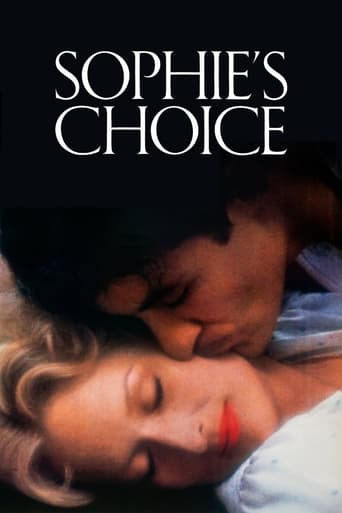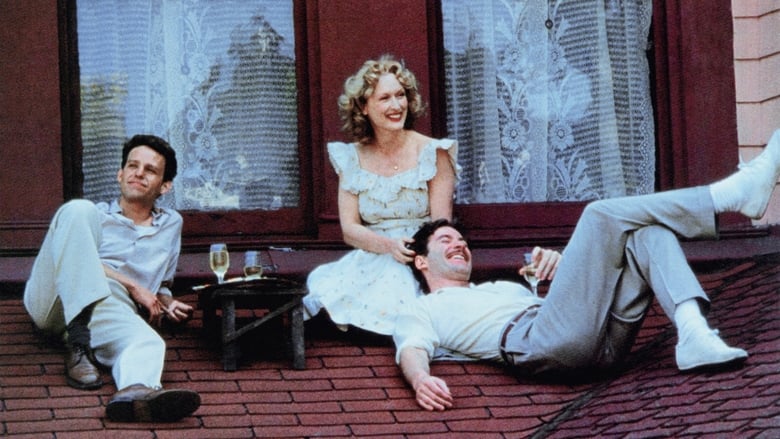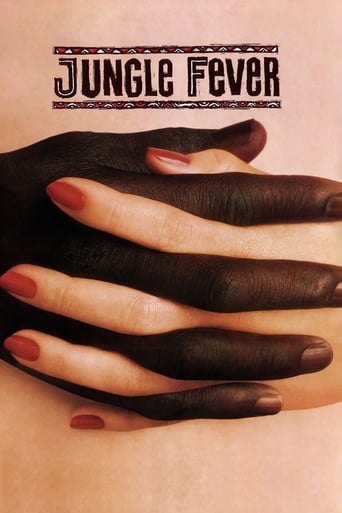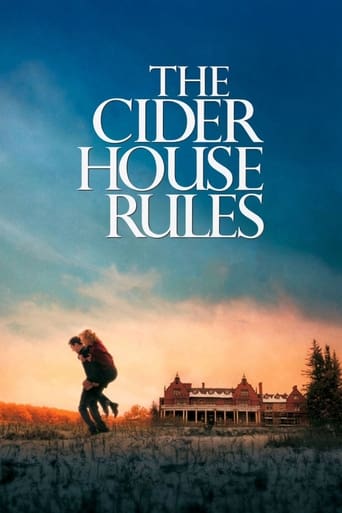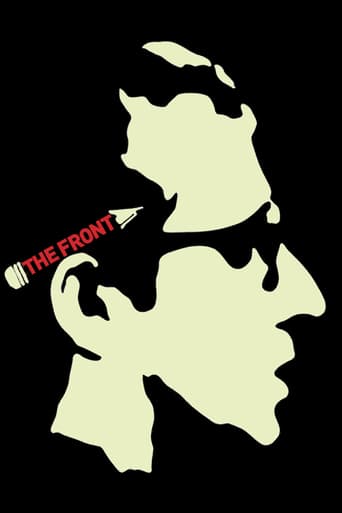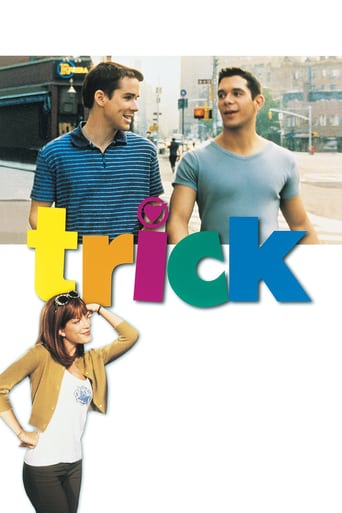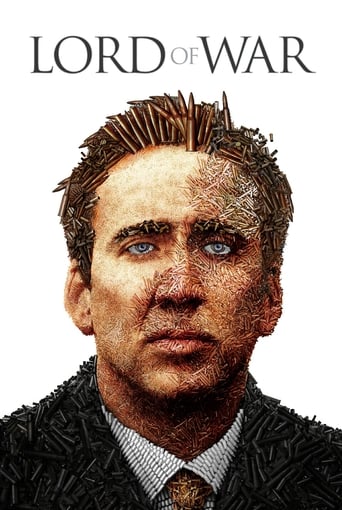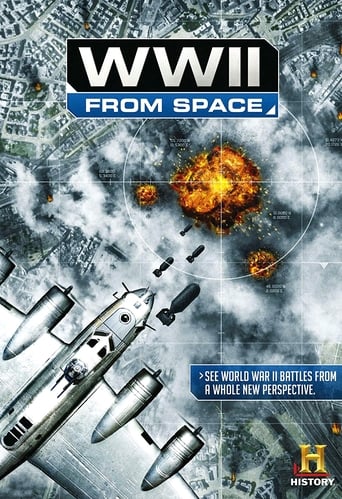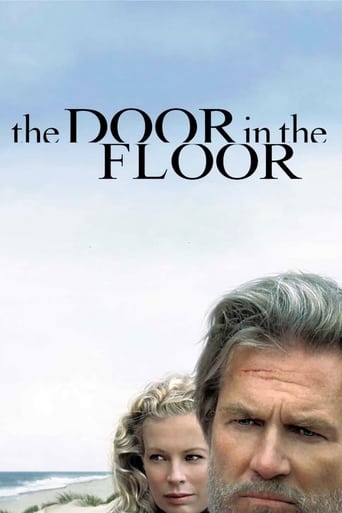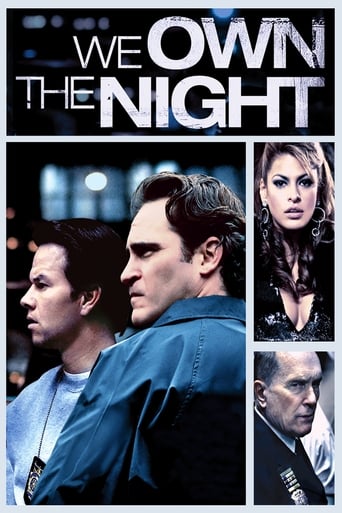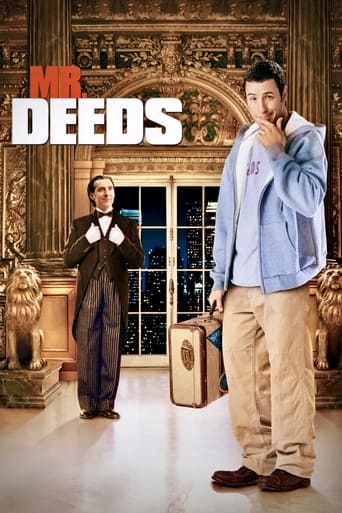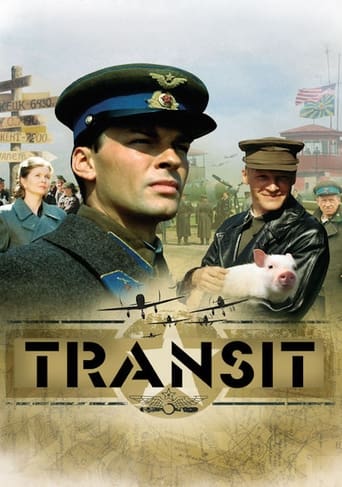Sophie's Choice (1982)
Stingo, a young writer, moves to Brooklyn in 1947 to begin work on his first novel. As he becomes friendly with Sophie and her lover Nathan, he learns that she is a Holocaust survivor. Flashbacks reveal her harrowing story, from pre-war prosperity to Auschwitz. In the present, Sophie and Nathan's relationship increasingly unravels as Stingo grows closer to Sophie and Nathan's fragile mental state becomes ever more apparent.
Watch Trailer
Free Trial Channels
Cast


Similar titles
Reviews
everything you have heard about this movie is true.
A Masterpiece!
It is interesting even when nothing much happens, which is for most of its 3-hour running time. Read full review
This is ultimately a movie about the very bad things that can happen when we don't address our unease, when we just try to brush it off, whether that's to fit in or to preserve our self-image.
Hailed as the best female performance of all-time, Meryl Streep's harrowing incarnation of a Polish holocaust survivor Sophie Zawistowski is truly deserving all the laurels. Written and directed by Alan J. Pakula, the Oscar-nominated director of ALL THE PRESIDENT'S MEN (1976), SOPHIE'S CHOICE starts off as a sparkling JULES AND JIM (1962) frolic, but soon Sophie's past experience has been squeezed out of her buried memory, thanks to the amorous but volatile relationship with a passionate Jew Nathan Landu (Kline in his film debut).However, the film is told from a third person's angle, Stingo (MacNicol), whose voice-over is throughout the entire film, is a young writer comes to Brooklyn pursuing a career in 1947, and Sophie and Nathan are living upstairs in their boarding house. His very first encounter with them is being a self-conscious witness of a vehement squabble between them, on the staircase, Nathan blusters with medical terms to a whimpering Sophie, condemns their doomed relationship, and insolently taunts Stingo for his southern upbringing. But the next day, Nathan comes to make up with him and it turns out he is a great guy when he is not angry, the three of them chum around and Stingo begin to know more about them.Stingo has an incurable crush on Sophie, who is a decade older than him, and vastly admires Nathan's enthusiastic passion for love, literature and music, he doesn't mind to be the third wheel around them, the three form a perfect rapport, except for one thing, Nathan's fitful outburst of rage, jealousy and spite, which the film throws repeatedly to takes the stage, to the convenience of allowing a thoughtful and tender Stingo to comfort Sophie subsequently, then Sophie will confide to him her heart-wrenching life story before arriving in USA. And each time, we get closer to the truth, but like Sophie says to Stingo, even if you know the truth, it doesn't mean you can understand it better.Sophie is not a Jew, she was sent to the concentration camp simply because she tried to smuggle some ham for her ill mother, and more shockingly her father is indeed an avid anti-Semite, who is killed by Nazi because of his nationality, they don't care about his ideology, that is the paradox of Sophie's story, but trenchantly lays bare the barbarian kernel of war: no matter how noble (or in the case of WWII, cockamamie) its cause is, war will most probably turn into a genocide under the volition of those few who seize the power, individualism doesn't stand a chance to secure safety and the civilised is usually the first to die.The character, who speaks Polish, Germany, French and English with a Polish accent in the film, is no doubt Streep's most demanding role and she pours so much empathy and commiseration into her flawless rendition, never over-the-top and never a dull moment with her presence. Sophie is a victim, period, she shouldn't be persecuted for being the survivor while millions are murdered (she was doing all she could to stay alive in the camp); or accountable for her father's radical thoughts, (in her own defence) she has never sided with her father; as for the choice she made between her son and daughter, it is utterly unethical, the cruelest thing ever could happen to a mother. Sophie is innocent, that's why the finale comes off quite uncomfortable, there is no need for her to be martyrised? She has no will to live, probably, but she is not a sinner, very possibly time will heal it, yet why oh why she cannot leave that deadly poisonous man? She had a better choice and forfeited, she doesn't want to promise something she cannot promise, right, but a self-destructive submission is not the best thing her story can offer.Nathan, in Stingo's words, is utterly fatally glamorous, and fittingly, the film reveals the secret of his side, not so plausible (one cannot figure what is the deal behind the day when he claims his biological research has made a Nobel-worthy progress) but Kevin Kline is marvellously bipolar switching from a forcible menace to an amiable life-force, to and fro.Another bone to pick with this otherwise superb war-panning essay, is its clichéd exigency to fulfill a male's ultimate fantasy: "you're a great lover, Stingo!", after Sophie finally sleeps with him, this is what a man really wants to hear, even though she leaves without saying goodbye, and at least five times with lines like "you are so beautiful" are referred to Sophie from different characters, as a constantly vexing reminder of the shallow canon from a man's perspective, beauty is a woman's original sin, even in Auschwitz, next time, we might wage a war to exterminate all the unsightly ones, that definitely would make the world a more eye-catching place!
t may surprise some to know that despite a thirty-five year career, seventeen Oscar nominations, fifty films and a reputation of being one of the best actors of her generation, Meryl Streep has been named Best Actress by the academy only twice. It first happened in 1983 with Sophie's Choice and it wouldn't happen again for 28 years when she won for playing Margaret Thatcher in The Iron Lady. I think Sophie's Choice is still her best. Not that her subsequent roles haven't been excellent, but it is within this sad melodrama that her best gifts are displayed.Her achievements, on the surface, come from the way she prepared for the role. Her legendary ability with accents began here as she gives Sophie a polish accent and plays the flashback sequences speaking Polish and German. But those are the technical achievements, what she is able to portray in Sophie Zawistowski is a woman who is happy, playful and sexy, but just under the surface suffers a thinly veiled level of pain. Around the edges of her lips, in the closed in lines around her eyes, we sense there is a buried horror in her past.We meet Sophie, a survivor of the death camps at Auschwitz, through the eyes of Stingo (Peter McNichol) a naive young kid from the south who has designs on being a great writer. This is 1947, in the years immediately following the war and he has moved north to Brooklyn, New York where he meets Sophie, a polish immigrant living with her lover, a brash older man named Nathan Landau (Kevin Kline). Sophie and Nathan become friends and their friendship gradually begins to break down the blinders of Stingo's adolescence. There's a level to Sophie that doesn't become immediately clear, but also doesn't reveal itself all at once. We learn that she was a polish-Catholic who was thrown into a concentration camp for trying to smuggle a ham. She lost both of her children in the camp and then survived the camps herself and immigrated to the United States.She has experienced a lifetime of hurt and pain, of loss and of sorrow, but she tries to soldier on in her life by trying to put it all behind her. Yet, erasing all of her memories won't make them go away, they still reside within her. Look at the way her makeup whitens her face, as if the experience has left her a ghost of her former self. Her voice is very sweet but her speech seems somewhat cautious as if telling stories about those experiences are too difficult to put into words. What I intuit from Sophie, whose present life has very few walls as she drinks and takes up with a lover, is that she spent so many years having to watch her step and keep herself within a small confined space that now she simply lives at will.In her former life, in the death camps, she had to watch every move, every syllable, every motion. One of the best observances in the film is during one of the flashbacks in which she and a fellow inmate use the Auschwitz Walk, walking through deep areas of mud but trying to only step in the footprints of the people who have gone before. Observe how that scene connects to later scenes in which she is carefree and dances at will but when she is frightened, her footsteps are very small.It may have seemed more rational to simply tell Sophie's story through Sophie's eyes without the narrative of Stingo's growth from callow youth to a young man who, and how this experience makes him a better writer. But I think we need that understanding to bring her story to the surface. What happens to Sophie in the end is only fitting because her life in the wake of the holocaust was more or less meaningless except in it's relation to Stingo's understanding of human nature. There's nothing left for her and finally, in the end, she has found some peace.
Sophie's Choice is one of those films I always meant to watch, and finally got the chance. It is best to go into it with as little idea as to what it's about as possible, as it's a slow film with a lot of layers that get peeled off one by one. A young would-be-author from the South moves to Brooklyn and befriends his neighbors, the couple Nathan and Sophie. All three hit it off, but Nathan's bipolar tendencies do puncture their friendship at times. Sophie, however, is a calm soul as kind as she is tortured by her past in Auschwitz. As the author, Stingo, gets to know them better, he is also taken deeper and deeper into Sophie's past, where a hidden pain resides.Sophie's Choice brilliantly captures two polar opposite worlds. The colourful and tranquil Brooklyn is contrasted strikingly by a late 1930s Poland occupied by Nazis, where the colour drains so much out of the film that any further and it would be black-and-white. The present in Brooklyn is a good haven to have and catch our breath between glimpses into Sophie's horrible past.At the end of the day, in spite of the emotionally shattering story, Sophie's Choice is a story about hope and redemption. The performances certainly helped. Peter MacNicol and Kevin Kline are both wonderful as polar opposite personalities, united by a common love for literature.But Meryl Streep is utterly mesmerizing as Sophie. It's not for no reason that this was one of those Oscar-nominated performances of hers that gave that extra edge and got her the statue. All of Sophie's mannerisms, her accent, her speaking German and Polish, her searching for words in English to express what she wants to say, her restrained kindness, her pain; none of it overdone. The director even trusted Streep enough to take long shots with her as she gets into deep characterization. This is quite simply one of the finest female performances in cinema.I did fear, throughout the film, what exactly Sophie's choice was, and I was right, for it is a scene that crushes your heart. But the film comes together in the end and ends in an emotionally satisfying way in spite of everything. Steel yourself for an emotional journey and give Sophie's Choice a view, it's a film as uplifting as it is depressing, and unmissable for cinema buffs.
The only bit of information about her on IMDb reads: "Attended Tulane University" (the field of study is not even hinted at...). Under her Filmography, there is only one title: "Sophie's Choice"... This is all that remains from a very impressive performance of 1982 by a little girl whose name was Jennifer Lawn. Those who first saw the famous "choice" scene toward the end of the film, where the Academy Award winner Meryl Streep was holding terrified little Jennifer in her arms, must have foreseen a bright future for this kid actress who might easily fool the viewers into believing that she was actually living the scene, rather than just acting it! "A future Oscar winner in the arms of a present one", one might have prophesied back in 1982. Unfortunately, this prophecy never came true... If you have seen the movie, you are certainly familiar with this intensely dramatic scene (DON'T watch it if you have NOT seen the film and plan to do so!): costas-music.blogspot.gr/2012/12/sophies-choice-choice-scene.html

